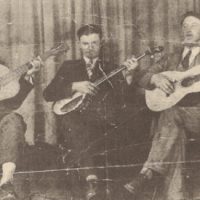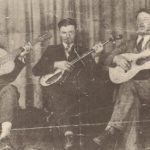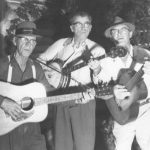
Carolina Tar Heels
The Carolina Tar Heels recorded three dozen songs that were issued by the Victor label in the 1920s and early 1930s, in addition to a reunion album released in the early 1960s, and their recordings have a legacy and influence that remains present in old-time and Americana music communities.
The nucleus of the band was banjo player and singer, Dock Walsh, the self-proclaimed “Banjo King of the Carolinas” from Wilkes County. Walsh was a school teacher, who got the notion to try and make it in the music business. He moved to the Atlanta, Georgia area, where he knew recordings were then being made on occasion. Walsh eventually got an audition for Columbia, who released his first recordings in 1925, followed by another session in 1926.
In the summer of 1926, Walsh met Gwin Stanley Foster around the Gastonia, North Carolina area. Foster played harmonica and guitar, and the two teamed up with another pair to create the Four Yellowjackets. The group auditioned for the Victor label, but famed A&R man, Ralph Peer, was only interested in Walsh and Foster. He called them The Carolina Tar Heels and recorded four songs with them as a duo, releasing them that year. The two made more recordings later that summer, but the group was not meant to last. Back home, Walsh and Foster lived too far apart to make the band functional. Foster teamed up with fellow piedmont musician, Dave Fletcher, to create The Carolina Twins, making several recordings for Victor.
Meanwhile, Walsh recruited fellow Wilkes County native, Garley Foster, who was of no relation to Gwin. Garley Foster played guitar and harmonica like Gwin, and he had an incredible knack for whistling. He was nicknamed “The Human Bird,” because he could make his whistling sound like various songbirds – an example of which can be heard in the opening seconds of “My Home’s Across the Blue Ridge Mountains.” He was also said to have been able to whistle and vocalize the sounds of a sawmill in operation.
In 1928, Clarence “Tom” Ashley joined the band. Ashley had already recorded as a solo musician on the banjo and with Byrd Moore. Ashley played guitar and sang with the Carolina Tar Heels through 1928 and the spring of 1929, recording 17 songs during this period. When not making records, Ashley was mostly touring with medicine shows, while Walsh and Foster performed as a duo.
After Ashley left, in the spring of 1929, Walsh and Garley Foster continued together, performing and attending several more recording sessions together in 1930 and 1931, and as the Pine Mountain Boys in 1932. Walsh also recorded one more session with Gwin Foster in 1932 as “The Original Carolina Tar Heels,” because another group was using the name while performing on radio in Atlanta. The Depression put a major damper on most recording and professional musicians, and Walsh and Foster returned to Wilkes County for other work in construction and the poultry business.
In the 1960s, Walsh, Garley Foster, and Walsh’s son, Drake Walsh, got together and recorded an album for Folk Legacy, celebrating the music of the Carolina Tar Heels. Drake Walsh continued to perform music from his father and the Carolina Tar Heels for many decades more, and the music of the band continues to appear on old-time, folks, blues, and Americana compilations, instilling the legacy of the Carolina Tar Heels.




